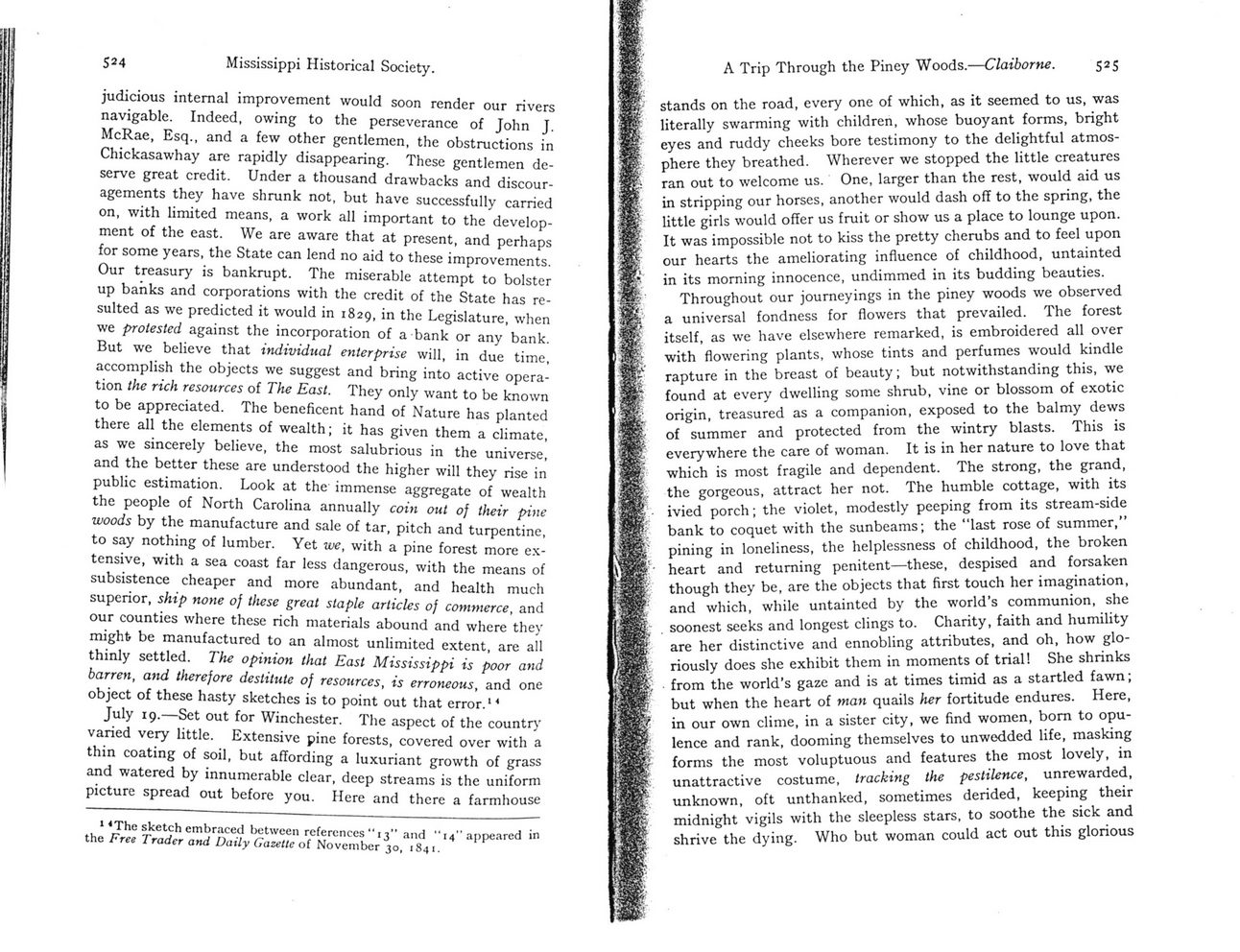This text was obtained via automated optical character recognition.
It has not been edited and may therefore contain several errors.
524 Mississippi Historical Society. judicious internal improvement would soon render our rivers navigable. Indeed, owing to the perseverance of John J. McRae, Esq., and a few other gentlemen, the obstructions in Chickasawhay are rapidly disappearing. These gentlemen deserve great credit. Under a thousand drawbacks and discouragements they have shrunk not, but have successfully carried on, with limited means, a work all important to the development of the east. We are aware that at present, and perhaps for some years, the State can lend no aid to these improvements. Our treasury is bankrupt. The miserable attempt to bolster up banks and corporations with the credit of the State has resulted as we predicted it would in 1829, in the Legislature, when we protested against the incorporation of a bank or any bank. But we believe that individual enterprise will, in due time, accomplish the objects we suggest and bring into active operation the rich resources of The East. They only want to be known to be appreciated. The beneficent hand of Nature has planted there all the elements of wealth ; it has given them a climate, as we sincerely believe, the most salubrious in the universe, and the better these are understood the higher will they rise in public estimation. Look at the immense aggregate of wealth the people of North Carolina annually coin out of their pine woods by the manufacture and sale of tar, pitch and turpentine, to say nothing of lumber. Yet we, with a pine forest more extensive, with a sea coast far less dangerous, with the means of subsistence cheaper and more abundant, and health much superior, ship none of these great staple articles of commerce, and our counties where these rich materials abound and where they might be manufactured to an almost unlimited extent, are all thinly settled. The opinion that East Mississippi is poor and barren, and therefore destitute of resources, is erroneous, and one object of these hasty sketches is to point out that error.14 July 19.?Set out for Winchester. The aspect of the country varied very little. Extensive pine forests, covered over with a thin coating of soil, but affording a luxuriant growth of grass and watered by innumerable clear, deep streams is the uniform picture spread out before you. Here and there a farmhouse 1?The sketch embraced between references ? 13? and "^"appeared in the Free Trader and Daily Gazette of November 30, 1841. A Trip Through the Piney Woods.?Claiborne. 525 stands on the road, every one of which, as it seemed to us, was literally swarming with children, whose buoyant forms, bright eyes and ruddy cheeks bore testimony to the delightful atmosphere they breathed. Wherever we stopped the little creatures ran out to welcome us. One, larger than the rest, would aid us in stripping our horses, another would dash off to the spring, the little girls would offer us fruit or show us a place to lounge upon. It was impossible not to kiss the pretty cherubs and to feel upon our hearts the ameliorating influence of childhood, untainted in its morning innocence, undimmed in its budding beauties. Throughout our joumeyings in the piney woods we observed a universal fondness for flowers that prevailed. The forest itself, as we have elsewhere remarked, is embroidered all over with flowering plants, whose tints and perfumes would kindle rapture in the breast of beauty; but notwithstanding this, we found at every dwelling some shrub, vine or blossom of exotic origin, treasured as a companion, exposed to the balmy dews of summer and protected from the wintry blasts. This is everywhere the care of woman. It is in her nature to love that which is most fragile and dependent. The strong, the grand, the gorgeous, attract her not. The humble cottage, with its ivied porch; the violet, modestly peeping from its stream-side bank to coquet with the sunbeams; the ??last rose of summer,? pining in loneliness, the helplessness of childhood, the broken heart and returning penitent?these, despised and forsaken though they be, are the objects that first touch her imagination, and which, while untainted by the world?s communion, she soonest seeks and longest clings to. Charity, faith and humility are her distinctive and ennobling attributes, and oh, how gloriously does she exhibit them in moments of trial! She shrinks from the world?s gaze and is at times timid as a startled fawn; but when the heart of man quails her fortitude endures. Here, in our own clime, in a sister city, we find women, bom to opulence and rank, dooming themselves to unwedded life, masking forms the most voluptuous and features the most lovely, in unattractive costume, tracking the pestilence, unrewarded, unknown, oft unthanked, sometimes derided, keeping their midnight vigils with the sleepless stars, to soothe the sick and shrive the dying. Who but woman could act out this glorious

Claiborne, J.F.H Claiborne-J.F.H-030